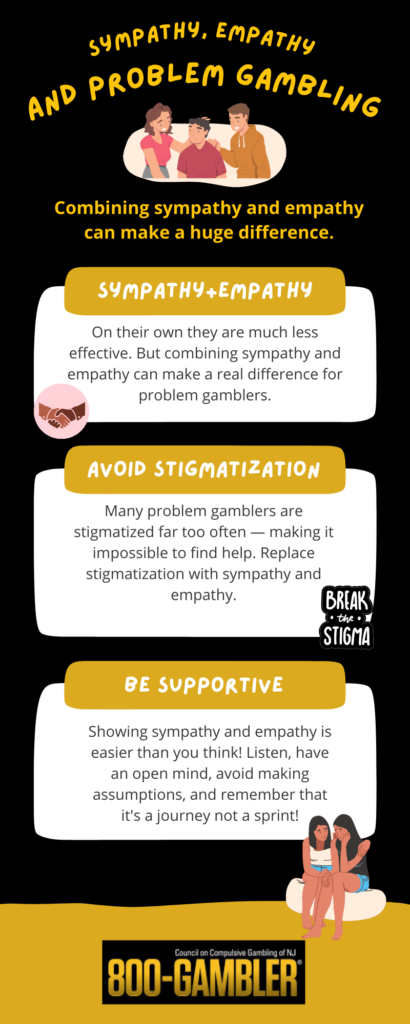Gambling problems are a serious concern that can affect anyone, regardless of age, gender, or socioeconomic status. Those struggling with problem gambling need compassionate, non-judgmental support to overcome their struggles and regain control of their lives. As a friend or family member, knowing how to provide adequate help and support can be difficult without coming off as insensitive or uncaring. But sympathy and empathy can do just that. We’ll show you how to display the right levels of compassion and help your loved one recover from problem gambling.

Sympathy vs Empathy: What’s the Difference?
Sympathy is defined as feeling sorry for someone else’s problems or misfortunes. It can be a helpful emotion, showing that you care and understand that the individual is going through a tough time.
Empathy, on the other hand, is defined as putting yourself in someone else’s shoes and understanding how they feel. It’s a deeper level of emotional connection and understanding that can help you communicate and support the individual more effectively.
So why is it important to understand the difference between sympathy and empathy when dealing with someone recovering from problem gambling? Because gambling can be a complex and challenging problem to overcome, and it requires more than just feeling sorry for someone.
When you show empathy for someone recovering from problem gambling, you can understand their situation and help them find ways to cope and heal. Empathy can help you develop personalized solutions that fit the individual’s unique needs and circumstances, such as finding support groups, counseling, or other resources.
In contrast, sympathy is often just a surface-level response that does not fully acknowledge the individual’s experiences or emotions. While sympathy is still important, it does not provide the same level of support as empathy. But when paired with empathy, it can make for a compelling combination that helps individuals of all conditions.
The Negative Impact of Stigmatization on Problem Gamblers
While resources are available for those seeking help, it is important to acknowledge and address the negative impact of stigmatization on problem gamblers.
Stigmatization is defined as the process of labeling and treating someone as abnormal or undesirable due to a particular characteristic or behavior. In the case of problem gambling, stigmatization can make it difficult for individuals to seek help, leading to feelings of shame and isolation.
The negative impact of stigmatization on problem gamblers cannot be overstated. For many, the fear of being judged or shamed can be a major barrier to seeking help. This can lead to a delay in treatment, which can only exacerbate the problem. So instead of stigmatizing problem gamblers, focus on providing proper levels of sympathy and empathy, and you can make a difference.
How to Show Sympathy and Empathy Towards Someone Battling Problem Gambling
You may be a bit fearful when having to show sympathy and empathy, especially when dealing with such a tense situation as problem gambling. But you can certainly do it with the right tips. We’ll explain how to properly show sympathy and empathy to those battling problem gambling.
First and foremost, it is essential to recognize that problem gambling is a real disorder, and it is not something that people can easily snap out of. People with problems gambling need support, love, and understanding. One of the best ways to show sympathy and empathy towards someone struggling with problem gambling is to listen to them with an open mind and without any judgment. By doing so, you can help them feel heard and understood, which can be incredibly healing.
Another way to show sympathy and empathy towards someone battling problem gambling is to avoid making assumptions about their behavior. It can be easy to label someone who frequently gambles as “greedy” or “reckless.” However, these assumptions are hurtful and often erode the trust necessary for open communication. Instead, try to understand that the person is struggling with a real disorder and support them in their journey toward recovery.
It is also important to recognize that recovery from problem gambling is a journey, not a destination. Recovery is a process that can take time and patience. As a supporter, being patient with the person and offering continued encouragement throughout their recovery journey is critical. Be there for them, celebrate their successes, and always offer a listening ear when they need it.
Contact 800-GAMBLER for Additional Support
Showing sympathy and empathy are two ways to support people in numerous facets of life, especially regarding problem gambling. And best of all, doing so isn’t as difficult as it may seem. With support from resources such as 800-GAMBLER, you can learn how to prioritize the individual in need and provide the right levels of sympathy and empathy that help aid in a successful recovery. If you or a loved one is struggling with problem gambling, utilize 800-GAMBLER and our suite of webinars and support for friends and family. Or call our helpline at 1-800-GAMBLER for direct support.



